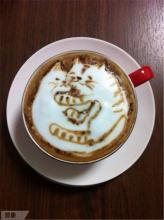The secret behind the world's most expensive coffee
At first, people picked up the excrement of civets from the wild, which was mixed with partially digested coffee beans. Gradually, more and more civets are kept in crowded, unsanitary cages on coffee plantations. Photography: ULET IFANSASTI, GETTY IMAGES
Researchers from the Wildlife Conservation Research Centre at the University of Oxford and the World Conservation Society, a London-based non-profit organization, assessed the living conditions of nearly 50 wild civets. The civets are kept in cages on 16 coffee plantations in Bali. The findings, published Thursday in the journal Animal Welfare, paint a grim picture.
From the size and hygiene of the cages to the normal movement of civets, all the plantations surveyed by the researchers did not meet the most basic animal welfare standards. One of the investigators, Neil D'Cruze, said: "some of the cages are so small that they can be called rabbit sheds. There is shit and urine everywhere, and civets can only soak in it. "
Some civets are so thin that their diet is so strict that they can only eat coffee cherries (fruits wrapped around coffee beans); others are fat because they are unable to move freely. D'Cruze says some are addicted to caffeine.
Worst of all, many animals are forced to stand, sit and sleep on the barbed wire ground 24 hours a day. "standing on that barbed wire all the time can lead to ulcers and bruises," D'Cruze said. They have nowhere to escape, and the pain and discomfort are persistent and dense. "
Would you like to drink coffee made from animal waste? This lovely tropical mammal has a unique ability: its excrement is the source of the world's most expensive coffee.
In addition, many civets do not have access to clean water or communicate with other partners. For these nocturnal animals, they have to endure the noise caused by traffic and tourists during the day, which is especially bad.
Is it wild or caged?
This is the "machine" of making luxury goods. Experts believe that the reason why Nouak coffee is so special is that wild civets choose high-quality coffee cherries to eat. Keeping them in cages and feeding old coffee cherries will only produce shoddy products.
Moreover, a coffee expert quoted the American Special Coffee Association, a trade organization for boutique roasters and baristas, as saying that Nouak coffee is not suitable for beginners. Although the civet's digestion does make the coffee taste smoother, it also makes the unique acidity and flavor of the coffee disappear.
A civet in a cage
The captive civet, most likely caught in the wild, is looking pitifully at the world outside the wire cage. Locals put them in cages to make the world's most expensive Nouak coffee. Photography: NICKY LOH, GETTY IMAGES FOR WSPA
There is no way to tell whether a bag of Nuwak coffee comes from a wild civet or is caged. In 2013, the BBC undercover investigation found that coffee produced by caged civets in inhumane environments would be marked as wild civets exported to Europe.
Even Tony Wild, which introduced Nouak coffee to the Western world, wrote a warning for the Guardian. 'The situation has become more and more industrialized, with abuse and counterfeiting everywhere,'he said.
There is no certification scheme to ensure that coffee marked "wild" lives up to its name, while coffee certification bodies with regard to the growing and production environment refuse to certify any Nuwak coffee.
The New York-based Rainforest Alliance and other prominent coffee certification bodies have issued their own certification standards based on the Sustainable Agriculture Network (SAN) standards, banning the capture and hunting of wild animals on plantations. In particular, it is forbidden in Indonesia to cage civets to produce coffee.
Another important sustainable coffee certification, UTZ, also forbids caging wild animals on plantations and says it will never certify Nuwak coffee.
Alex Morgan of the Rainforest Alliance (which adheres to the SAN standard) says the risk of certifying Nuwak coffee is too high to determine whether the beans come entirely from wild civets.
"I personally suggest avoiding this kind of coffee because it is probably made by civets in cages," he said.

Important Notice :
前街咖啡 FrontStreet Coffee has moved to new addredd:
FrontStreet Coffee Address: 315,Donghua East Road,GuangZhou
Tel:020 38364473
- Prev

Starbucks wants to make your money with ice cubes. You can save money like this.
For most people, Starbucks is a luxury in coffee. It costs several times more than regular coffee, but the coffee has shrunk, which has to be confusing. Just last Wednesday, a woman from Chicago sued Starbucks for cheating consumers on the grounds that there was too much ice in iced coffee. Not long ago, Starbucks offered
- Next

Woman thinks Starbucks iced coffee has too many ice cubes: claim for $5 million
This is the argument of prosecution lawyers in a current case against Starbucks, Quartz reported. Of course, the focus of the case is not ice cream, but iced drinks such as iced coffee. Stacy Pincus, a Chicago woman, filed a class action lawsuit against the coffee chain, accusing Starbucks of false advertising and overcharging consumers for its iced drinks.
Related
- Unexpected! Ruixing Telunsu lattes use a smoothie machine to foam milk?!
- % Arabia's first store in Henan opens into the village?! Netizen: Thought it was P's
- Does an authentic standard mocha coffee recipe use chocolate sauce or powder? Mocha Latte/Dirty Coffee/Salty Mocha Coffee Recipe Share!
- What is the difference between Vietnam egg coffee and Norway egg coffee? Hand-brewed single product coffee filter paper filter cloth filter flat solution!
- What is the difference between sun-cured and honey-treated coffee? What are the differences in the flavor characteristics of sun-honey coffee?
- How to make Italian latte! How much milk does a standard latte use/what should the ratio of coffee to milk be?
- How to make butter American/butter latte/butter Dirty coffee? Is hand-brewed coffee good with butter?
- Is Dirty the cold version of Australian White? What is the difference between dirty coffee/decent coffee and Australian white espresso?
- Relationship between brewing time and coffee extraction parameters How to make the brewing time fall to 2 minutes?
- Got entangled?! Lucky opens a new store, Mixue Ice City, and pursues it as a neighbor!

